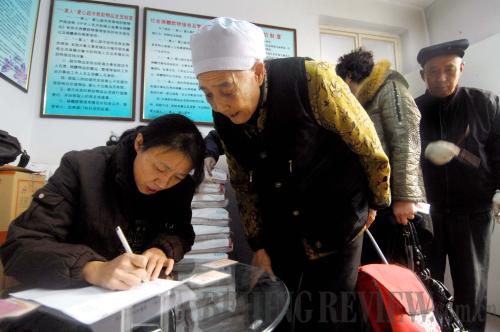|
 |
|
AID TO NEEDY: Low-income earners register for free daily necessities offered by the local government at a community service center in Yinchuan, Ningxia Hui Autonomous Region on November 15 (PENG ZHAOZHI) |
Much-anticipated Law
It has been almost 10 months since the publicizing of a new draft regulation to solicit public opinion on the dismantling of urban houses. The old regulation, which authorizes forced demolitions if homeowners fail to move out within the time required by the government, has been criticized as now being irrelevant in the wake of several cases of homeowners committing suicide. Five scholars, who wrote a letter to the National People's Congress, China's top legislature, demanding revision to the old regulation a year ago, voiced their dissatisfaction with the slow legislative process at a seminar on November 13.
While many people eagerly wait for a new regulation, forced demolitions with casualties are increasing in number. The impasse on the formulation of the new regulation has encouraged local governments' use of enforced demolition and fueled public outrage.
It's understood good laws take time and complicated procedures. But, when the public interest is always violated, it takes political will and courage to move forward arduous reform.
Huashang Daily
Regular Bonuses
Recently, Zhou Wangjun, an official with the National Development and Reform Commission, China's top economic planner, suggested, given the fast-rising prices of daily necessities, the government should consider offering allowances to low-income earners.
This official's suggestion would be a wise policy for the low-income earners if it was put into practice. But, the allowances, no matter their amount, would only enable low-income earners to afford badly needed necessities for a short period. The government should think about formulating a regular mechanism to solve their difficulties in the long run.
In terms of government allowances, China could learn from Singapore, which has a Growth Dividends program. The program uses part of the government's surplus to reward all adult citizens with cash annually. More importantly, the country does have the financial capacity to initiate a similar program since a large number of state-owned monopoly enterprises reap enormous profits every year.
Yangzi Evening News
Preventive Monitoring
Following a wave of media reports on the widespread practice in the food processing industry of using partly hydrogenated vegetable oils to replace natural animal fat, the Ministry of Health said on November 9 that it has been working to evaluate the health risks of trans fat contained in the oils and may amend national standards for food preparation. The use of trans fat will be banned in infants' food, said ministry sources.
This is a timely response to public food safety concerns, but before a new national standard comes out, customers will be at a loss about which foodstuffs they should trust.
The controversy over partly hydrogenated vegetable oils again indicates food safety regulation should not be only in response to health emergencies. Instead, it should be institutionalized to prevent such emergencies.
In this area, Hong Kong is a good example. The region's regulatory system consists of comprehensive and professional risk valuation, timely release of information and regular and strict inspections.
The Ministry of Health recently issued a regulation on the national food safety standards. It has one article saying any citizen, legal person or organization could propose the formulation of a new national food safety standard. It would be a good start if this policy could be well implemented.
People's Daily
Price Intervention
According to a recent report in Securities Times, several central government agencies are drafting a new regulation, giving provincial price regulatory departments the power to impose caps on housing prices in the event of dramatic price hikes after obtaining permission from their provincial governments.
It is understandable if the government tries to control prices of public housing projects, which has enjoyed land use and taxation incentives. But other housing properties are ordinary commodities, whose prices should be determined by supply and demand.
Considering the soaring housing prices in many cities since last year, the government's direct intervention does comply with stipulations in the Price Law. However, this should be the government's last resort in a market economy. Central and local governments have already introduced many measures to rein in housing prices in recent years, such as limiting the number of new homes each household is allowed to buy, tightening payment requirements, increasing mortgage interest rates and cracking down on developers who hoard land. Now we need to evaluate the effectiveness of these policies. If soaring prices have been curbed or there are alternative tools to control prices, then direct price intervention will be unnecessary.
Yangcheng Evening News | 